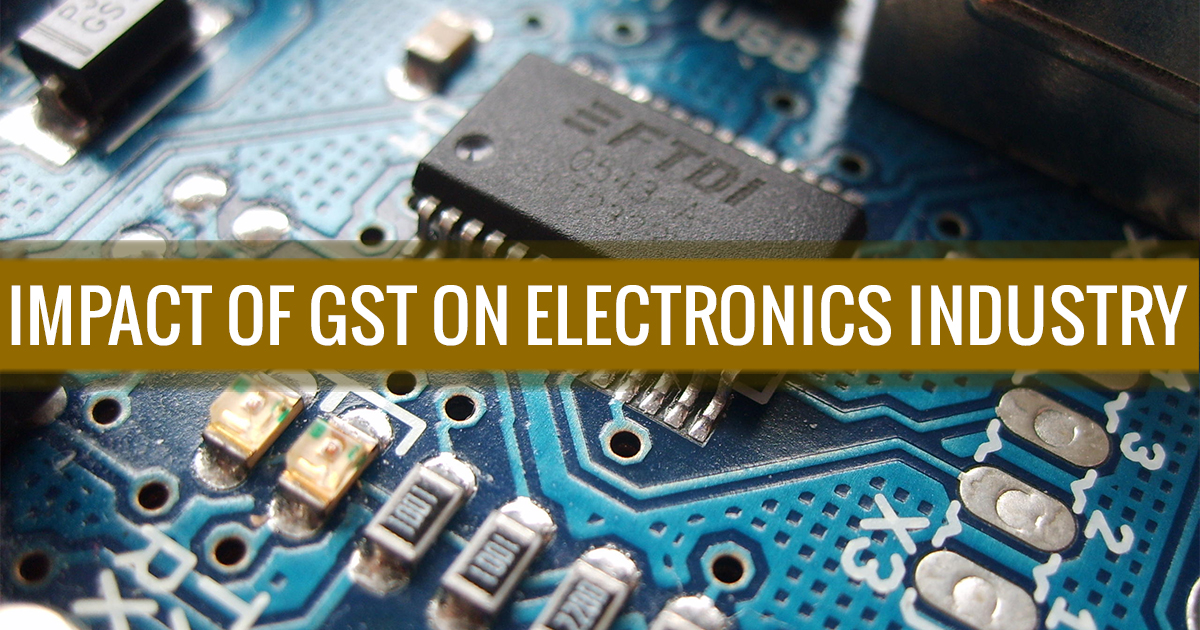
GST impact on the electronics industry is slightly negative as there are many products which are liable to be under lesser tax slab but still reeling under heavy tax pressure. As many electronics products are consumer durables which are now daily used items even in low-income families, this notion must be relieved that electronics are still the luxury product. Just for an example, the government has put the washing machine into the highest tax slab i.e. 28 per cent which in no way justifies the taxing strategy.
GST being a new indirect tax reform brought a complete change in our economy. It leads to a great impact on the Gross Domestic Product (GDP) of our country.
The GST attracts an additional tax rate over electronic items of about 4 to 5 per cent. Earlier it was 23 to 28% with cumulative tax (excise and value-added tax) and this time as the tax rates are set at 18 to 28 per cent on electronic goods, this will severely impact the rising electronic consumerism in the nation.
But still, Domestic electronic manufacturers are still under the budget in front of their MNC counterparts and have kept prices low in front of the higher GST rate of 28%. They have lowered the discounts and margins in order to keep the prices in check and have maintained decency in the market.
It is expected that electronic manufacturing in the domestic counterpart is much more feasible now after the GST application. This time it is speculated that the electronic manufacturer can provide the tax profits to their customers after the GST.
Electronics and technological tax compliance can go hand in hand and it will create an environment which will suit the industry in near future. And after everything, the studies from major research companies suggest that India will be the hub of manufacturing electronics.
The Indian Electronics industry welcomes the new structure of the GST regime as the same will bring a new era in the indirect taxation landscape of modern India, paving the way for a simplified tax structure for goods and services. GST not only eliminates multiple levies but will also allow deeper penetration of digital services into the consumerism of India.
Goods and service tax is proving to be very much beneficial for electronics manufacturers due to the introduction of GST as the ultimate cost of warehouses and logistics are now reduced and the manufacturers are now passing on this cost reduction benefit to the consumers by which ultimate consumers of electronic products will be benefited. Electronic products like Air conditioners, Refrigerators, Television, fan, cooler, etc. are now cheaper with the assistance of the manufacturers too.
However, the GST rates are higher which can also prove detrimental to the industry furthering the impact on sales. A new draft rule and regulation is also proving the same as it mentions that even if the consumer is purchasing a new electronic item and availing exchange offers on the product, then the discount received will not consider anymore for the tax deduction. In the present scenario, one gets a discount on the VAT applicable as it is only on the cash part but the goods and service tax has changed this rule and will levy GST on the whole product price regardless of the discounted part.
GST has changed the present system of production-based taxation to a consumption-based one. Under GST service provider and his customer should be in a position to claim full credit of GST. This will provide an opportunity for service providers to take benefit of the tax efficiency and recoup additional profits on the supply.
Recommended: List of Goods and Services Not Eligible for Input Tax Credit
States like Maharashtra and cities including Mumbai will, however, see a decline as the octroi is set off after the GST. The prices of electronic appliances are lowered priced due to the factors of simplified tax structure and removal of cascading effects of the taxes. The GST impact on the electronics industry will give a boost to the demand for appliances across the nation.
Price Reduction After 23rd GST Council Meeting
Under government company, Energy Efficiency Services Ltd (EESL) comes up with reduced prices of 50 Watt fans at Rs. 1100 down from earlier Rs. 1200. The move has been taken in accordance with the recent tax slab reduction on fans from 28 per cent to 18 per cent. However, 9W LED bulbs and 20W LED tube lights will carry their earlier price of Rs. 70 and Rs. 220 respectively.